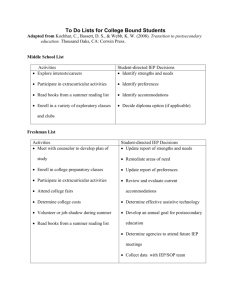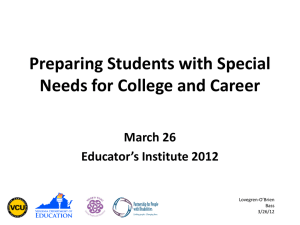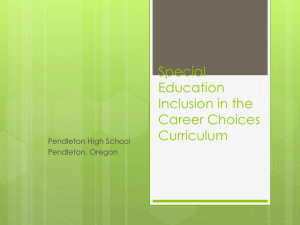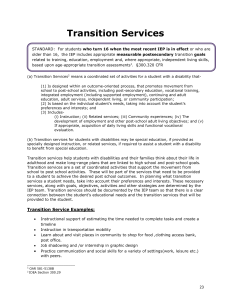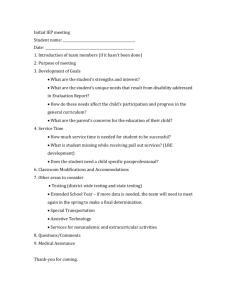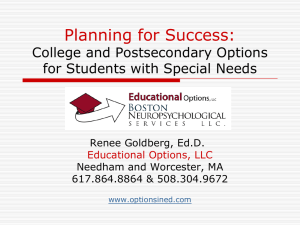Suggested Services and Activities
advertisement
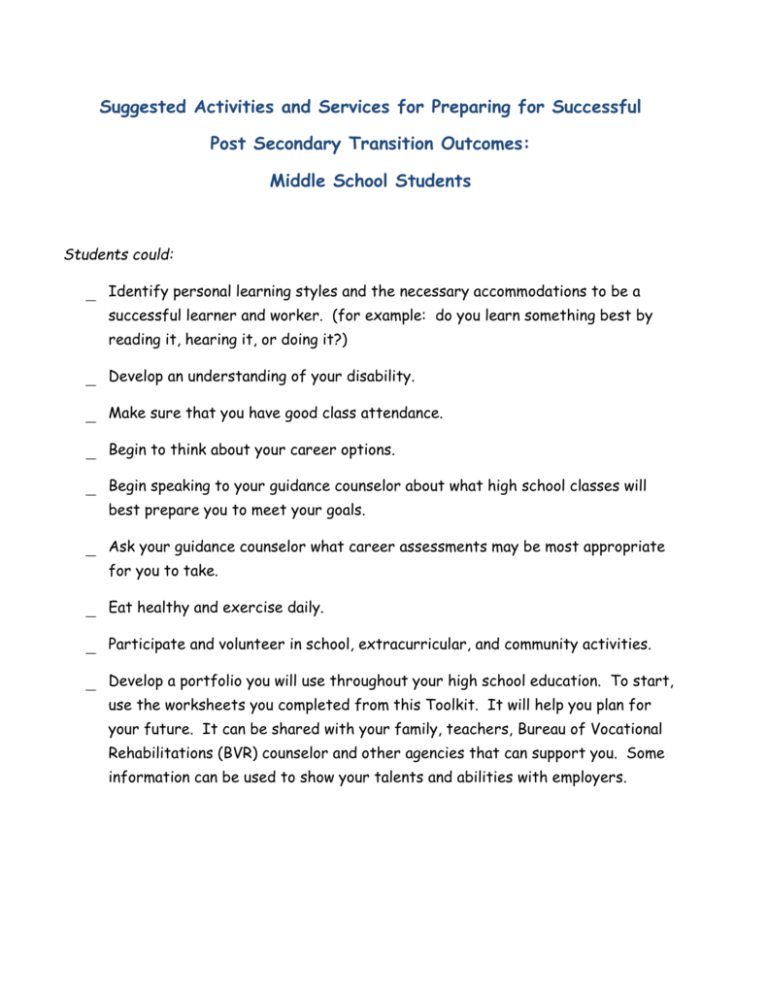
Suggested Activities and Services for Preparing for Successful Post Secondary Transition Outcomes: Middle School Students Students could: _ Identify personal learning styles and the necessary accommodations to be a successful learner and worker. (for example: do you learn something best by reading it, hearing it, or doing it?) _ Develop an understanding of your disability. _ Make sure that you have good class attendance. _ Begin to think about your career options. _ Begin speaking to your guidance counselor about what high school classes will best prepare you to meet your goals. _ Ask your guidance counselor what career assessments may be most appropriate for you to take. _ Eat healthy and exercise daily. _ Participate and volunteer in school, extracurricular, and community activities. _ Develop a portfolio you will use throughout your high school education. To start, use the worksheets you completed from this Toolkit. It will help you plan for your future. It can be shared with your family, teachers, Bureau of Vocational Rehabilitations (BVR) counselor and other agencies that can support you. Some information can be used to show your talents and abilities with employers. Suggested Activities and Services for Preparing for Successful Post Secondary Transition Outcomes: NINTH GRADE Students could: _ Attend and be involved in IEP meetings with parents, teachers and special education personnel. _ Develop a clear understanding of your disability and how it affects your life. _ Broaden experiences through community activities and expand friendships. _ Find out if you are eligible to get financial supports such as Supplemental Security Income (SSI), Medicaid, and state waiver programs. _ Ask the school about career assessments and exploration programs at the high school (e.g., Does the school provide career counseling or testing?). _ Meet with guidance counselors about courses required for employment, vocational training, and college or postsecondary school (i.e., Foreign Language, Math, English, Science, etc). _ Be able to describe your disability and advocate for supports and accommodations. _ Have an identification card and be able to communicate personal information. _ Discuss plans/goals with parents about what you will do after you graduate. _ Start thinking about where you would like to live and the supports needed to live there. _ Meet with guidance counselors about future plans. Obtain information about employment, vocational training, and colleges or postsecondary schools. _ Search Web sites for employment, vocational training, colleges and postsecondary schools to learn more about course requirements, potential Students could: majors, costs, services for students with disabilities, living arrangements, activities, student life etc. _ Look into driver’s education when the time is right. And pursue and use local transportation systems outside of your family. _ Explore assistive technology (such as wheelchairs, computer reader programs, and TTY, etc.) to be more involved in your community and to reach your goals. _ Consider volunteer opportunities in your community to better yourself and your opportunities for careers. _ Start practicing skills in decision making, time management, and organization skills. _ Understand your health care needs and be able to communicate this to you medical team. _ Participate in extracurricular activities. _ If you are considering vocational training, participate in an open house at a Career and Technical Education Center. _ Become informed about sexuality and family planning. _ Continue to build your portfolio you will use throughout your high school education. To start, use the worksheets you completed from this Toolkit. It will help you plan for your future. It can be shared with your family, teachers, BVR counselor and other agencies that can support you. Some information can be used to show your talents and abilities with employers. Suggested Activities and Services for Preparing for Successful Post Secondary Transition Outcomes: TENTH GRADE Students could: _ Broaden experiences through community activities and expand friendships. _ Continue attending IEP meetings and become more involved in the decisions made. _ Find out if you are eligible to get financial supports such as Supplemental Security Income (SSI), Medicaid, and state waiver programs. _ Search the Internet and other resources (i.e., books, articles) to learn more about your disability. _ Identify how your disability impacts you in the classroom, at work, and in social settings. You should be able to discuss your disability and its affect on your education. _ Learn more about the differences between accommodations adjustments in college, employment, or independent living versus high school. _ If you are considering college, think about taking the PSAT, which is a practice test for the SAT, which many colleges require for entrance. Explore possible accommodations for the test. Go to the College Board Web site for more information: http://www.collegeboard.com/testing/. _ Begin to use accommodations that are more in line with what is used in college or training and employment after high school. Individualized instruction and certain modifications used in high school will not be provided after high school. _ Participate in a career assessment and make appropriate career choices. These choices should match your individual strengths and goals for postsecondary education. _ Research the requirements needed to achieve your goals in postsecondary employment, education, or independent living. Students could: _ Participate in volunteer and paid work experiences. _ Meet with your guidance counselor to determine if the courses you are taking can help you reach your goals in postsecondary education, employment, and independent living. _ Visit and tour colleges and postsecondary school campuses. _ Become involved in activities beyond the classroom (i.e., clubs, sports, student government, community service, volunteer organizations, etc). Postsecondary schools look for these activities in addition to grades and test scores when determining admissions. _ Discuss options and choices for employment, postsecondary living, and independent living with parents. _ Practice and learn independent living skills such as budgeting, cooking, shopping, and housekeeping. _ Identify adult health care providers. _ Know how your interests can help you learn about jobs you might like to do. _ Take part in job shadowing experiences. _ Talk to your family, friends, and people in the community about employment opportunities. _ Investigate support services available through vocational rehabilitation, public welfare, local transportation systems. _ Identify needed personal care attendant (PCA’s) services, and if appropriate, learn to direct and manage these services. _ Practice job interviewing skills. _ Know what accommodations you need to work and be able to explain them to someone you trust, so you’re ready to talk to an employer. Students could: _ Find out if your school or BVR counselor has employers that would help you practice interviews. _ Go to job fairs to learn about jobs. _ Use tools and resources on the internet to learn about jobs, like what training is needed, salaries and whether the jobs are in your community. _ Apply for jobs. _ Participate in a community-based work assessment and learn your strengths and weaknesses are, and the supports you need. _ Ask your teacher if you can explore work through unpaid work experiences as part of your transition plan. _ Use the assessment worksheets in this toolkit to help you explore and prepare for a job. _ Be honest with yourself about what you’re good at and work on the things you could improve. _ Continue to build your portfolio you will use throughout your high school education. To start, use the worksheets you completed from this Toolkit. It will help you plan for your future. It can be shared with your family, teachers, BVR counselor and other agencies that can support you. Some information can be used to show your talents and abilities with employers. Suggested Activities and Services for Preparing for Successful Post Secondary Transition outcomes: ELEVENTH GRADE Students could: _ Continue attending IEP meetings and become more involved in the decisions made. Invite individuals from the Bureau of Vocational Rehabilitation (BVR) and other service agencies. _ Broaden experiences through community activities and expand friendships. _ Participate in volunteer and paid work experiences. _ Continue to develop self- advocacy skills (asking for help, communicating needs to others, etc.) _ If you are having trouble locating a specific school or program on your own, make an appointment with your guidance counselor. _ Learn how to ask for job accommodations _ Postsecondary Education _ Attend college fairs. _ Research college disabilities services web sites or call the office to learn about eligibility for services, documentation guidelines, and services offered. Also, pay particular attention to admissions criteria, admissions deadlines, financial aid information, scholarship information, programs, cost, housing and food services. _ Contact the disability services office for a face-to-face meeting. Learn more about the academic accommodations and supports that are offered and for which you qualify. Students could: _ Meet with a representative from the admissions office to find out admissions criteria. What will be needed in addition to filling out an application? _ Be aware that accommodations and supports in postsecondary education may be different than they are in high school. Begin to think more independently and practice stronger self advocacy. For example, if you are using an aid, begin to think about how you would work more independently. _ Continue to research college web sites. Research application procedures, course requirements, and entrance requirements for colleges of interests. _ Identify tests required for admission at the college or colleges chosen: (e.g., SAT I, ACT Assessment, or SAT II Subject Tests). _ Register and take the SAT and the ACT, if not taken in the tenth grade. Explore possible accommodations for the test, and apply for them. For information regarding SAT testing for students with disabilities, go to the following web site: http://www.collegeboard.com/ssd/student/index.html. Discuss the results with guidance counselor and parents. _ Contact the Bureau for Vocational Rehabilitation (BVR) for information about services for high school and college at http://www.dli.state.pa.us, click on disability services, click on BVR. _ Complete an assistive technology assessment for college, if you plan to use assistive technology in college. _ Obtain documentation of disability from current assessments (within two years of graduation date) because colleges require assessments. _ The summer prior to senior year, visit the disability office, learning centers, computer labs and assistive technology labs at postsecondary schools and colleges of interest. Student could: _ Ask your teacher or BVR counselor is there are any pre-college experience programs that you could attend over the summer, or take a college course for the experience. Employment _ Know how your interests can help you learn about jobs you might like to do. _ Take part in job shadowing experiences. _ Talk to your family, friends, and people in the community about employment opportunities. _ Investigate support services available through vocational rehabilitation, public welfare, and local transportation systems. _ Identify needed personal care attendant (PCA’s) services, and if appropriate, learn to direct and manage these services. _ Practice job interviewing skills. _ Know what accommodations you need to work and be able to explain them to someone you trust, so you’re ready to talk to an employer. _ Find out if your school or BVR counselor has employers that would help you practice interviews. _ Attend job fairs to find out about jobs. _ Use tools and resources on the internet to learn about jobs, like what training is needed, salaries and whether the jobs are in your community. _ Apply for jobs. _ Participate in a community-based work assessment and learn your strengths and weaknesses are, and the supports you need. Student could: _ Ask your teacher if you can explore work through unpaid work experiences as part of your transition plan or an internship. _ Use the assessment worksheets in this toolkit to help you explore and prepare for a job. _ Be honest with yourself about what you’re good at and work on the things you could improve. _ Continue to build your portfolio you will use throughout your high school education. To start, use the worksheets you completed from this Toolkit. It will help you plan for your future. It can be shared with your family, teachers, BVR counselor and other agencies that can support you. Some information can be used to show your talents and abilities with employers. Independent Living _ Independent living is about more than just where you live, it is about choosing how, where, and with whom you live. _ Begin making connections to agencies that could help you, like centers for independent living and housing authorities. _ Find out if you are eligible to get financial supports such as Supplemental Security Income (SSI), Medicaid, and state waiver programs. _ Eat healthy and exercise daily. _ Practice and learn independent living skills such as budgeting, cooking, shopping, and housekeeping. _ Start thinking about how you are going to pay for living on your own. If living on a fixed income, think about getting on a waiting list for low income housing. Suggested Activities and Services for Preparing for Successful Post Secondary Transition Outcomes: TWELFTH GRADE Students could: _ Continue attending IEP meetings and become more involved in the decisions made. Invite individuals from the Bureau of Vocational Rehabilitation (BVR) and other service agencies. _ Broaden experiences through community activities and expand friendships. _ Practice effective communication by developing interview skills, asking for help, and identifying necessary accommodations at post secondary and work environments. _ Prepare transition packet for disability documentation that includes: evaluation reports, transcripts, test scores, current IEP, medical records, writing samples, and letters of recommendation. _ Participate in volunteer and paid work experiences. _ Become involved with advocacy and support groups. _ Take responsibility for arriving on time to classes, work, appointments, and social activities. _ Assume responsibility for health care needs, such as making appointments, and filling and taking prescriptions. _ Register to vote at age 18 (and register for selective service.) _ Identify adult support provided by community based agencies. _ Obtain letters of recommendation for employment and education (remember to get letters from teachers before graduation.) Postsecondary Education Student could: _ Begin completing postsecondary school and college applications. Applying early may increase the chance of getting into school or college of choice. _ Learn about advocating and talking to your instructors about academic accommodations. _ Research the disability services office Web site to review documentation guidelines and obtain what is needed. _ After you have been accepted into a college, contact disability service offices at colleges to schedule and participate in an intake appointment. _ At the intake meeting for disability services, provide the correct documentation about your disability and services to the office. Discuss requested academic adjustments to determine if your request is reasonable (academic adjustments received in high school are not always appropriate for college). _ Submit documentation to the disability services office at the postsecondary schools or colleges that you have chosen. _ Meet with a professor, academic advisor, or representative of the college major you intend to pursue. _ Meet with financial aid office to discuss and apply for scholarships, grants and aid. _ Schedule an appointment with the Bureau for Vocational Rehabilitation (BVR) http://www.dli.state.pa.us/landi/cwp/view.asp?a=128&q=61197 to discuss assistance available. _ Request and schedule an assistive technology assessment through OVR, if applicable. _ Talk with students who are receiving services at the college and other postsecondary education training settings about their experience. Employment Student could: _ Know how your interests can help you learn about jobs you might like to do. _ Take part in job shadowing experiences. _ Talk to your family, friends, and people in the community about employment opportunities. _ Investigate support services available through vocational rehabilitation, public welfare, local transportation systems. _ Identify needed personal care attendant (PCA’s) services, and if appropriate, learn to direct and manage these services. _ Practice job interviewing skills. _ Know what accommodations you need to work and be able to explain them to someone you trust, so you’re ready to talk to an employer. _ Find out if your school or BVR counselor has employers that would help you practice interviews. _ Develop a career portfolio to show your talents and skills. _ Use tools and resources on the internet to learn about jobs, like what training is needed, salaries and whether the jobs are in your community. _ Apply for jobs. _ Participate in a community-based work assessment and learn your strengths and weaknesses are, and the supports you need. _ Ask your teacher if you can explore work through work experiences or internships as part of your transition plan. _ Use the assessment worksheets in this toolkit to help you explore and prepare for a job. _ Be honest with yourself about what you’re good at and work on ways you could improve. Student could: _ Ask your teacher or BVR counselor if you can participate in an internship. _ Continue to build your portfolio you will use throughout your high school education. To start, use the worksheets you completed from this Toolkit. It will help you plan for your future. It can be shared with your family, teachers, BVR counselor and other agencies that can support you. Some information can be used to show your talents and abilities with employers. Independent Living _ Make detailed plans for independent living. Continue development of independent living skills. _ Find out if you are eligible to get financial supports such as Supplemental Security Income (SSI), Medicaid, and state waiver programs. _ Eat healthy and attempt to exercise daily. _ Practice and learn independent living skills such as budgeting, cooking, shopping, and housekeeping. _ Begin to think about what kind of insurance you will receive after high school. _ Independent Living is about more than just where you live, it is about choosing how, where, and with whom you live. Think about the following questions: _ Do you want a house or an apartment? _ Will you have roommates or pets? _ Do you have any accessibility or transportation needs? _ Develop a list of questions you want to ask each landlord Preparing for Successful Postsecondary Transition Outcomes: Middle School through Twelfth Grade The following materials are designed to provide students, parents, and school staff suggestions on activities and services for students involved in the multi-year preparation of students to successfully transition to life after high school in the post secondary goal areas of education, work, and independent living. Use these materials as a resource to help in this process. Some suggestions may be beyond the capability of students and will need to be modified or not implemented. You may not have the immediate availability of some of these suggestions, but you may also have other options that are not listed. Transition planning is to begin in the middle school and appear on the IEP when a student turns 14. The planning activities and services provided to students are to becomes more specific as the student decides on more specific goals in the three transition goal areas (education, work, independent living). This list of possible services and activities to select from is very lengthy. Don’t think there is an expectation to implement most of the suggestions as that would be impossible. School staff has the obligation to select those activities and services that reasonably support the student being prepared to reach their post secondary goals after high school graduation. Decide which suggestions provide that you can and will implement to support the student in reaching their stated IEP transition goals. Every transition goal should have at least one and preferably two or more activities or services written in the IEP that support each transition goal. The services and activities are unique to the needs of the student and not something every student (regular or special) receives by being enrolled in the class. They are in addition to what he/she would receive by being a student in the general education curriculum. Remember, that students and parents are not to be written in the IEP as being the “Responsible Person” for any service or activity. The IEP is the document which indicates what the school or outside agencies will provide to the student to meet their special educational needs.
